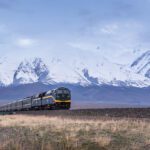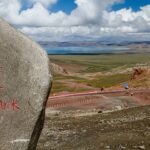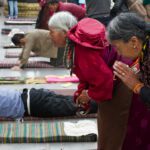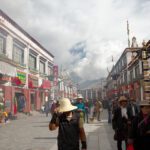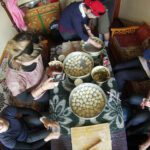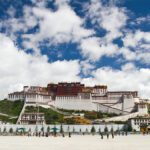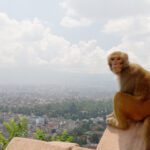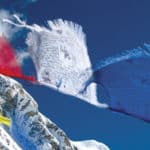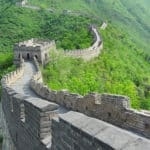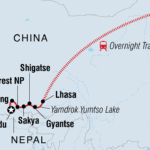Tibet: Beijing to Kathmandu Overland
Go on an epic 5000-km overland journey from imperial Beijing, through the mystical land of Tibet, to Nepal’s compact capital, Kathmandu. Experience one of the world’s greatest train journeys, discover the highland haven of Lhasa and visit the world’s highest monastery in the heart of the Himalayas. You’ll find temples aplenty, divine landscapes and unbeatable views of Mt Everest. Celebrating Buddhist cultures past and present, this insightful journey to the Roof of the World is simply unforgettable.
15 days, from
$4,505
per person
GROUP SIZE
ACTIVITY LEVEL
Details
Countries Visited:
China
Nepal
Accommodation: Hotel (11 nights), Overnight Hard Sleeper Train (2 nights), Permanent Tented Camp/Guesthouse (1 night)
Transportation: Overnight Sleeper Train , Private Bus , Public Bus
Included Meals:
- 2 lunches
Group size: Minimum 1, Max 12
Like everything else it does, China’s ancient history is on a grand scale – see it first-hand, with time to explore and walk the epic Great Wall’s Mutianyu section.
Sit back and relax on one of the world’s greatest train journeys – a marathon 45-hour ride to the literal Roof of the World, passing by incredibly mountainous and remote terrain, and the occasional grazing yak!
Immerse yourself in Tibetan culture, from the spiritual side – explored on monastery visits, pilgrim trails and a monk-led meditation session – to traditional daily life, experienced at a momo-making class and Tibetan family home.
Climb phenomenal mountain passes and thrilling peaks on your scenic overland journey to see the mightiest of them all – Mt Everest – and visit the world’s highest monastery on your way!
Relax in lovely Thankot after an epic journey in Tibet and enjoy a short hike to Indradaha, admiring the snowy peaks of Langtang, Ganesha and Manaslu.
Itinerary
Touch down in China’s capital, Beijing, ready for a high-altitude adventure! Your trip begins with a welcome meeting at 6 pm, where you’ll meet your group leader and travel companions. After this important meeting, why not get together with your group for an optional dinner, perhaps finding one of the best Beijing duck restaurants in the city. Your group leader will definitely know of some wonderful places where you can eat this delicious speciality.
Today, you’ll take an early morning drive (approximately 2 hours) to visit one of the most well-preserved areas of the Great Wall – the Mutianyu section. An incredible piece of engineering, the wall stretches 6000 kilometres westwards from the mountain ridges north of Beijing. It's a 30-minute climb up some steep steps to reach it, but you’ll be rewarded with an incredible view of the Great Wall winding along the mountains. Travel back to the city and in the late afternoon, transfer to Beijing West Railway Station – one of the biggest and busiest in the world – to start your mighty train journey to Lhasa (approximately 45 hours). Be aware that, on the odd occasion, there may be interruptions to this schedule – see the ‘Special Information’ section of your first day in Beijing for more details.
Today, all you can do is sit back, relax and take in the mountainous ridges and remote terrain along the highest railway in the world. The journey takes you through the major cities of Xi'an, Lanzhou and Xining, and across the wide open highlands of Qinghai-Tibet Plateau, with a speckling of grazing yaks and sheep, plus a glistening lake. On this second night, you’ll climb in altitude and your breath will likely be taken away by the changing landscapes outside the windows – snow-dusted black cliffs and mountain peaks illuminated by moonlight.
Say goodbye to your local train pals and your 'home' for the last two nights after lunch time, and be greeted by Lhasa's crisp mountain air. The colourful and historic holy city of Lhasa is situated in a small valley, and for hundreds of years it was a mysterious place, virtually unknown to the outside world. Lhasa remains an intriguing city with deeply fascinating cultures, sights and stories. Check in to your hotel later this afternoon and begin to get acclimatised with both the city and the altitude.
Start your first full day in Lhasa with a walking tour of the old town. Walk among pilgrims on Barkhor Street, otherwise known as Holy Road. Encircling the sacred Jokhang Temple, this incense-scented street is where Tibetan Buddhists perform meditative koras, following the loop in a clockwise direction. Around noon, visit a local cooking school to learn how tsampa (ground barley, a Tibetan staple), yak butter tea and momos (moreish Tibetan dumplings) are made. After lunch, visit Sera Monastery and witness the resident monks taking part in heated debates in the courtyards – you probably won’t understand a thing that they are debating, but their exaggerated gestures and the passions they display make this one of the most exciting people watching spots in Lhasa.
This morning, visit Potala Palace, the incredible former home of the Dalai Lama that’s perched 130 metres above the city. The palace is divided into two parts: the White Palace (secular and used as offices) and the Red Palace (home to chapels, shrines, and tombs of Dalai Lamas). Your guide will give you the inside scoop on what is truly a wonder of the architectural world. Afterwards, visit Jokhang Temple – considered the spiritual heart and most sacred temple of Tibet. It always attracts steady waves of pilgrims. Explore this large world heritage-listed site and learn a thing or two about its history. According to legend, the temple was built atop a lake after many failed attempts to build monasteries nearby. Afterwards, enjoy some free time and maybe find a Tibetan tea house, try some sweet Tibetan milk tea or savory yuk butter tea and mingle with the hospitable locals.
Traverse a scenic section of the Tibetan Plateau on a long drive (approximately 8 hours including stops), heading towards Gyantse, crossing over stunning mountain passes as you twist through dramatic valleys and peaks. Go by the shimmering Yamdrok Lake, climb the Khama La Pass, spot sheep herder villages scattered along the banks, and marvel at the soaring Noijin Kangsang – the peak of the Lhagoi Kangri Mountain Range. You’ll stop by the roadside town of Nangartse for lunch, before driving the Karo La pass, then descending to your destination for tonight, Gyantse. This small rural town is perfect to just wander around and watch contemporary Tibetan life play out in front of you – where pilgrims mix with pop music, cows stroll past cowboys on motorbikes and monks go about their daily business.
This morning, check out the unique Gyantse Kumbum – an impressive layered stupa on the grounds of the Pelkor Monastery. Each floor of this six-level structure can be visited, and as you wind up the floors past several tiny chapels, the air fills more and more with incense and the passageways get narrower on each step towards enlightenment. Later today, there’s a chance to experience a simple lunch at a family’s home, which is a great opportunity to listen to some personal stories of living in Tibet, all the while enjoying warm hospitality. After lunch, head towards Tibet’s second-largest city, Shigatse, taking about 2 hours. Translating to ‘all fortune and happiness gathered here’, Shigatse is a busy, mountain-clasped city that’s rapidly modernising. With some free time this afternoon, maybe head to the local bazaar and check out the local wares that this town has to offer.
This morning, take a visit to the Tashilhunpo Monastery. Your group leader will take you on a tour through parts of the monastery – each building has its own intricate decorations, legends and religious imagery. Be sure to ask for directions to the tranquil Chapel of Jampa and meditate on the world's largest gilded statue. The courtyard outside of the Kelsang Chapel is one of the best places to observe the pilgrims and monks prepare for ceremonies. In the evening, perhaps join the pilgrims on their kora (prayer circuit), spinning prayer wheels on a 1-hour walk around the perimeter of the monastery while taking in its splendid, atmospheric views.
Continue your journey west to the town of Sakya (approximately 3-4 hours). This region is known for its grey (kya) earth (sa), and so, provides the town’s name! Its monastery was built in 1073, and was originally in two sections, one on either side of the Zhongqu River, until the Northern structure was destroyed during the Cultural Revolution. The Southern Monastery is built in a medieval 'Mongolian' style, and rather than being whitewashed, the secular buildings are painted red, white and grey in honour of the three Buddhist Tulkas (notable lamas). You’ll have time to explore inside its high walls and admire some of its many shrines, temples and monastic residences. Afterwards, your leader will take you to meet new friends at the local nunnery. You’ll be introduced to shy but friendly resident nuns, sit down and enjoy some laughter together, and just for a second, forget that you don’t speak each other’s language at all.
An exhilarating drive (approximately 5–6 hours) brings you to Everest National Park. Upon arrival, leave your main luggage in the vehicle and take an overnight bag on the park shuttle to Rongbuk Monastery – the world's highest monastery. On a clear day you might spot Everest (Qomolangma in Tibetan) behind its stupa. Share tea with a resident monk and learn what life is like here, before taking part in a short meditation – where better to find stillness than this lofty centre of spirituality, surrounded by timeless mountains? Tonight you’ll camp in yak hair tents. Relax at the site or take a walk to Everest Base Camp Monument Stone. This is the closest you can get to Base Camp on the Chinese/Tibetan side. Witnessing Everest renders many speechless – your leader will explain why it's such so sacred for Tibetans. Afterwards, opt to hike to the upper monastery, visiting caves where monks meditated centuries ago.
Take one last look at Everest close up before the long drive ahead (approximately 10 hours including stops). You’ll travel to the Tibet–Nepal border today, stopping at the closest town of Kyirong. It’ll be roughly a 10-hour drive today, but this long effort will be worth it with the changing scenery around you – from the barren highlands of Tibet to the deep Alpine Valley. Put your feet up tonight and enjoy a dinner with your Tibetan leader who will say goodbye to you tomorrow.
This morning, cross the border from Tibet into Nepal. Keep in mind today that your Tibetan group leader and driver will bid you farewell at the border, and you’ll need to pass through immigration and customs unaccompanied. Once you’ve crossed the border, your Nepal group leader will be waiting on the other side! The border crossing can be long and dull depending on the queues and volume of people, so it is best to be patient. After the formalities are all over, head on a 5-hour drive to the charming town of Thankot. At your resort, take the afternoon and evening to chill out and enjoy the sweeping views of the Kathmandu valley, perhaps with a drink in hand.
Stretch out with an easy 2-hour hike to the sacred Indradaha – a perfect place to witness panoramic views over the valley towards the lesser-known but no less striking peaks of Langtang, Ganesh and Manaslu. On your way, there’s also a chance you’ll see spotted deer and monkeys in the surrounding lush forest. Later on, make your way into Nepal’s capital, Kathmandu, for the afternoon. Take some free time to explore the old town and feel the hustle and bustle of the big city. At night, why not get your group together for an optional final dinner to celebrate how far you’ve come travelling on your overland adventure.
With no activities planned for today, you are free to leave the accommodation at any time. That doesn’t mean your adventure has to come to an end! As you haven’t had much time to explore Kathmandu, we recommend spending an extra couple of days to explore the city and its charming vibes. If you would like to spend more time here, we’ll be happy to organise additional accommodation (subject to availability).
